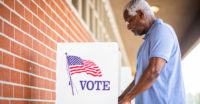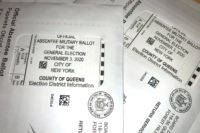Absentee / Mail-in Voting
All states have some form of absentee or mail-in voting due to federal requirements. These voters normally include military and overseas citizens, voters with disabilities and students who reside in a different state. For example, absentee or mail-in ballots are sent to these military and overseas voters 45 days prior to federal elections. However, absentee or mail-in voting is often limited by states to a number of valid excuses based on age, absentee status or an inability to vote on Election Day.
Some states have a greater number of reasons and valid excuses to vote absentee ballots by mail or in-person in an election office. A number of states have no-excuse absentee or mail voting. Lastly, a number of states have implemented an entire method of mail-in balloting that includes return of ballots to secure boxes or by postal mail. Oregon instituted an all-mail-in balloting system in 1998 and other states like Washington and Colorado have instituted similar all mail ballot methods of voting.
Mail-in and absentee balloting provides certain vulnerabilities to the electoral system:
- One stated general purpose for no-excuse absentee or mail ballot voting is to increase convenience and reduce long lines on Election Day. However, “Election Day” has become “Election Month,” which has increased the overall costs of election administration. County election offices that must process a large number of mailed ballots will experience significant delays in releasing official election results. A month or more of voting dramatically increases the overall costs to political campaigns for poll watching and get-out-the-vote efforts prior to Election Day.
- Mail-in ballots are not cast in the secure polling place where precinct poll workers can confirm addresses and verify identification. A great deal of voter fraud and abuse of absentee and mail-in ballots has been documented across the country. Absentee or mail-in balloting may spur a short-term increase in turnout in local elections; however, there is no evidence that voting by mail increases overall turnout for the long term in general elections.
- Absentee or mail-in balloting requires the use of the U.S. Postal Service (USPS) to transmit and return the ballot. This often causes delays to the election office. Citizens in states that use mail-in ballots often authorize the return of ballots to secure mail boxes that voters can use if they distrust the postal service.
A number of states authorize or require in-person absentee voting with verification by voter ID, and some states require a voter ID at the time of absentee or mail-in ballot request or return.
Alternatively, many states that allow absentee or mail-in voting use signature comparison to verify the identity of the voter. Many believe that signature verification is error-prone and not uniformly implemented by election officials across the country. While signature verification does catch a small percentage of invalid ballots or voter fraud, the system often fails to identify a great many irregularities associated with absentee or mail-in voting. Alternatively, many argue that signature verification routinely disenfranchises thousands of voters when it is used to ferret out an invalid signature.
ACRU Commentary
ACRU’s Spakovsky: List of proven vote fraud cases continues to grow
The Heritage Foundation keeps a record of proven, prosecuted cases of vote fraud in the United States. In May, the case number reached 1,285. Most cases have numerous fraud victims, making each a force multiplier for stolen votes. In the last ten years, there are have been at least eight cases where a candidate won with fewer than 17 votes - three where the margin was one vote. Vote fraud is real, and it matters.
ACRU’s President Roman: If You Can Go to the Grocery Store, You Can Go to the Polls
ACRU President Lori Roman points out that if Americans are confidently buying food and household goods in every state on a daily basis while using prudent precautions, then why are liberals insisting we can't vote in person? She blows the lid off the mail-only voting scam, calling it out as a potential for massive fraud.
ACRU’s Roman: It is time to renew our commitment to free, fair, and secure in-person elections
ACRU president Lori Roman was recently asked by the Ohio House of Representatives to provide testimony about the dangers of mail-only voting.
Pennsylvania Officials Admit Duplicate Ballots Were Mailed Out to Voters
Last week, Allegheny County, Pennsylvania’s top election official admitted that duplicate ballots had been sent to registered voters but said he did not know how many were sent, according to the Pittsburgh Post-Gazette:
Texas vote-by-mail expansion blocked by state Supreme Court
Although the court sided with state Attorney General Ken Paxton's interpretation of what constitutes a disability, it indicated that it is up to voters to assess their health and determine if they meet the state's definition, which could allow them to vote by mail.
California mail ballots: tossing them from buildings would be just as secure
The number of registered voters is fluid. Voters move, they pass away, and in California, people can register to vote when applying for a driver’s license even if they are not citizens. Those residing in institutional settings are a revolving door of voters. Therefore, Governor Newsom’s directive to send a ballot to every “registered voter” is the opposite of vote integrity. The state’s GOP is suing to stop this travesty. We wish them the best in nipping this potential fraud in the bud.
News
Protect Elderly Votes Project Aims to Thwart ‘Vote Harvesting’ Fraud
The Daily Signal reports on ACRU's Protect Elderly Votes and Stranger Danger campaigns, created to protect seniors' votes from theft, manipulation and outright ballot fraud.
Absentee ballot recipients worry they may have been drafted
Civilian voters in Queens got quite a surprise when they received military absentee ballots. Once again, we see absentee ballot errors corroding vote integrity. The only way to ensure your vote is counted is to Vote In Person.
Liberal vote activist foundation, collect ballots thyself
Much like the CTCL described in the previous story, the Committee of Seventy is a PA-based liberal voting activist group masquerading as non-partisan. Its Director is a Clinton/Reno protégée, and is funded by liberal foundations. Now the City of Philadelphia has contracted with this group to help collect ballots.
Liberal vote activist foundation, funds liberal vote activist foundation advisor
The Center for Tech and Civic Life is a leftist group claiming to use technology to “modernize” voting. Funded by liberal companies and run by self-identified progressive and Obama-affiliated staff, it is insinuating itself into elections. CTCL just gave Dallas County election administrator Toni Pippins-Poole $15 million for “voting operations” after Gov. Abbott wisely halted the liberal push for unsolicited mail-only ballots. Coincidentally, Ms. Pippins-Poole is also a CTCL advisor.
County Commissioner accused of using disability protections to cheat
All fraud stories are awful, but some are absolutely disgraceful. An elected Democrat official in Texas and his buddies have been charged with illegal ballot harvesting — getting “voters’ to pretend they were disabled and entitled to ADA guidelines. Let’s hope being charged with 130+ felonies is a warning to other fraudsters thinking about using important disability community protections as a scheme to steal votes.
“People who already sent their ballots in will be destroyed”
With above referenced Freudian slip, the Newyago county clerk notified local voters that, whoops, a (Republican appointed) judge was “left off” absentee ballots already mailed. However this oversight occurred, it will surely cause — at best — confusion for voters. “Didn’t I vote once already?” Just another example that mistakes can cause as much vote disruption as fraud. Vote In Person!










